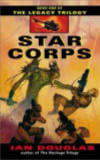This is the sequel trilogy to the exciting Heritage Trilogy. Set a hundred years further in the future, the books flesh out the backstory significantly and satisfyingly. The Marine Corps focused action remains, improved if anything. Douglas (a pen name for William H. Keith) writes about battles, troops and equipment with a gritty and realistic tone.
 Star Corps
Star Corps
Descendants of the An, prehistoric overlords of Earth, have been discovered on a planet in a nearby star system. Suddenly, the delegation sent there is attacked by these “Ahannu”. The Marines send a relief expedition on a ten year voyage (one way) to regain control. This book introduces the Marines featured in the first two books of the trilogy, in particular John Garroway, descendant of the main characters from the Heritage Trilogy. The Ahannu are just a bit player in galactic terms, though.
 Battlespace
Battlespace
After a ten year voyage back to Earth, the Marines are sent out again. Their twenty year absence has led to significant problems interacting with society, somewhat similar to what happens in Haldeman’s “The Forever War“. This time, the mission involves securing an alien stargate in the Sirius system, thought to be used by the “Hunters of the Dawn”, a very advanced race that destroys any life that could threaten it. At the gate, the Marines encounter another race, the Oannans/N’mah, which has been fleeing from and fighting the Hunters of the Dawn for millenia. After initial violence due to misunderstading, an alliance is formed.
 Star Marines
Star Marines
The action now jumps forward a century and a half, but the main characters are still Garroways. The Hunters of the Dawn, alerted by the destruction of their ship and gate in “Battlespace”, have decided that humans are a threat. A Hunter ship appears in Sol system and attacks. Earth is devastatated. The Marines launch a Doolittle Raid on the enemy, trying to buy the humans time. By the end of the Legacy Trilogy things are still very much up in the air about the future survival of humanity.
While the “Marines rule” theme in these books can sometimes be a bit heavy handed, this is quality military SciFi. The back story, only hinted at in the Heritage Trilogy, is fully fleshed out and well imagined.










